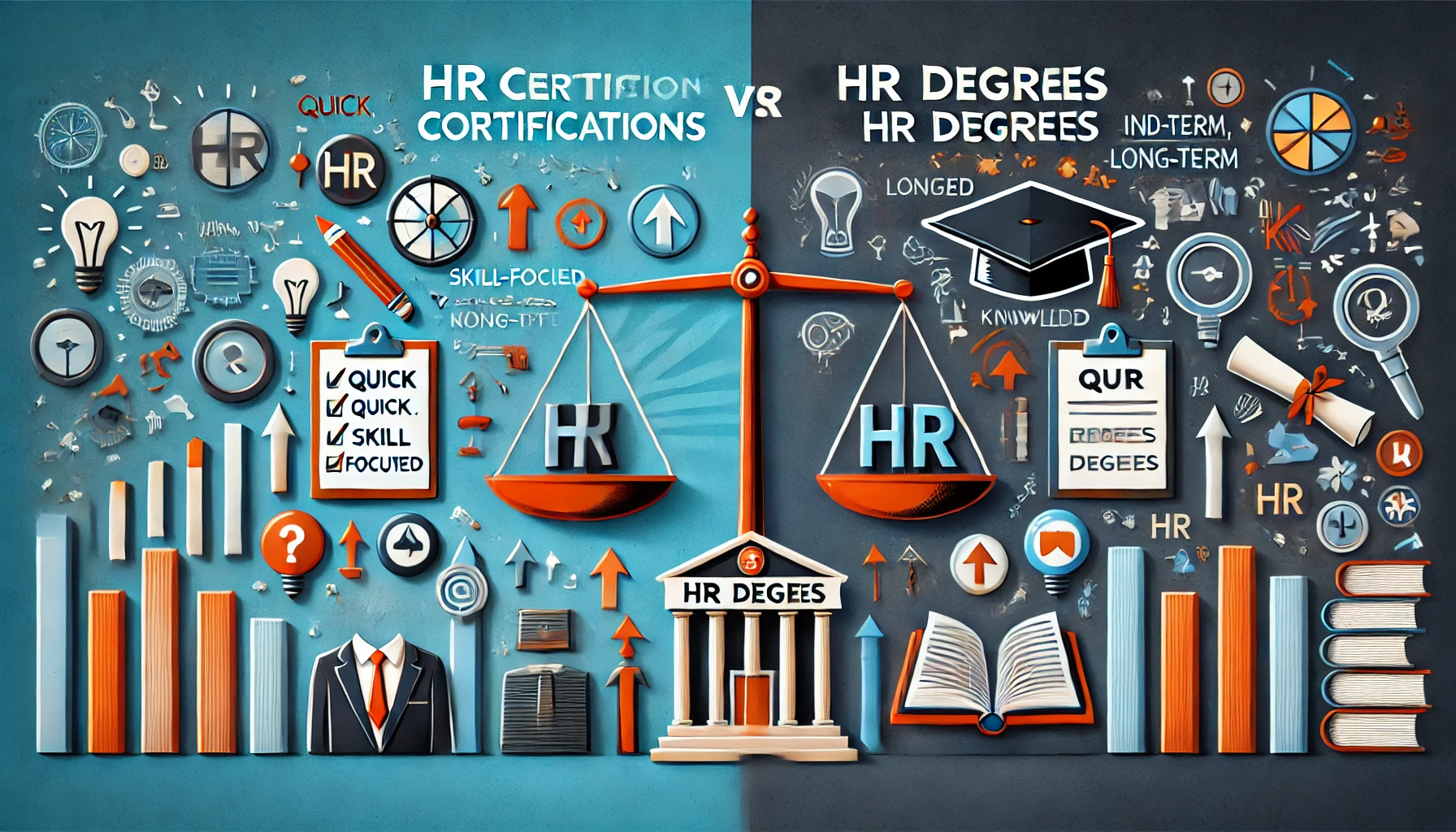
HR Certifications vs Degrees: Which is Right for You?
HR Certifications vs Degrees: The Overview
In today’s job market, many people in human resources (HR) face a big choice: should they take an HR certification course or get a degree? Both options have their own benefits, and picking the right one can affect your career. The future of HR is changing a lot due to technology and new work trends. Automation and artificial intelligence will take care of routine tasks, giving HR professionals more time to focus on big-picture strategies. Remote work and flexible schedules will likely become standard, so HR will need new ways to manage teams and encourage collaboration.
Companies will also focus more on diversity and inclusion, making sure everyone feels valued. Continuous learning will be important, as employees will need to update their skills regularly. Overall, HR will be key in creating workplaces that can adapt and thrive in the future.
What Are HR Certifications?
HR certifications are special credentials that show you have knowledge and skills in human resources. To earn a certification, you usually have to pass an exam, and some may require ongoing education to keep it. Some popular certifications include:
- SHRM-CP/SCP (Society for Human Resource Management)
- PHR/SPHR (Professional in Human Resources/Senior Professional in Human Resources)
- CHRP (Certified Human Resources Professional)
Why Choose HR Certifications?
- Targeted Knowledge: Certifications focus on specific areas of HR, like hiring practices or employee benefits. This means you can gain useful skills that are relevant to your current job or the job you want.
- Less Expensive: Compared to degree programs, HR Courses Online or Offline are usually more affordable. You can often complete a certification in a few months, making it a quicker way to boost your career.
- Quick Results: Employers often see certifications as proof of your skills and dedication. Getting certified can help you stand out on your resume and may lead to promotions or pay raises.
- Networking: Many certification programs offer chances to connect with other HR professionals, allowing you to build a valuable network in the industry.
The Value of HR Degrees
In contrast, an HR degree offers a broader education. Degrees can range from two-year associate degrees to four-year bachelor’s degrees, or even master’s degrees, and many colleges now have specialized HR programs.
Why Choose HR Degrees?
- Well-Rounded Education: A degree program covers many subjects, such as employment law, management strategies, and workplace behavior. This broad knowledge prepares you for various roles in HR and related fields.
- Career Growth: Many senior HR jobs require a degree. If you want to climb the corporate ladder, having a degree might be necessary.
- Long-Term Benefits: While certifications can make your resume stronger, a degree often holds more weight over the long term. Employers may see a degree as a sign of your commitment to your education and professional development.
- Access to Resources: Degree programs often provide extensive resources, like libraries, research tools, and career counseling, which can help you during and after your studies.
Comparing HR Certifications vs Degrees
Here’s a simple comparison to help you see the differences:
| Criteria | HR Certifications | HR Degrees |
| Duration | Short-term (a few months) | Long-term (2-4 years) |
| Cost | Generally lower | Generally higher |
| Scope | Focused knowledge | Broad education |
| Job Opportunities | Quick enhancement | Wider career options |
| Advancement | Not always required | Often necessary for senior roles |
When to Choose an HR Certification Course?
Opting for an HR certification course is a great choice for people who:
- Are already working in HR and want to specialize or move up in their current role.
- Don’t have the time or money for a full degree program.
- Want to quickly improve their job prospects or shift their focus within HR.
If you want to show your skills in a specific area of HR, a certification could be just what you need.
When to Opt for a Degree?
On the other hand, you should consider a degree if you:
- Are just starting your career and want a solid education.
- Plan to pursue higher-level HR positions that typically require advanced degrees.
- Want a comprehensive understanding of business management and workplace dynamics.
A degree can offer long-term benefits and provide more opportunities for career advancement.
Sum Up
Choosing HR Certifications vs Degrees ultimately depends on where you are in your career, your future goals, and your personal situation. If you want to quickly gain skills or specialize, an HR certification course may be the way to go. However, if you are looking for a well-rounded education that prepares you for various roles in HR, investing in a degree might be more beneficial.
As you make this choice, think about your current job, where you see yourself in the future, and what employers in your field are looking for. Both paths can lead to satisfying careers in human resources; the key is to find the one that fits your unique journey. Whether you choose a certification or a degree, the most important thing is to keep learning and growing in your HR career.





Leave Your Comment